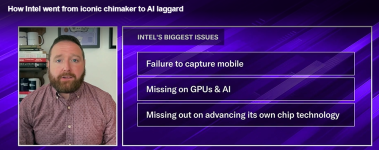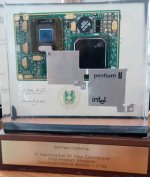Intel shares are rising on reports that the Trump administration is in talks to take a stake in the company. This comes as Intel has been struggling to compete with the changing tech landscape, facing increasing competition from tech giants like Nvidia. Joining Yahoo Finance tech editor Dan Howley. Dan, given everything that's been going on with Intel this week, we wanted to sort of take a step back, look at Intel's history, and figure out what went wrong, right? So what are some of Intel's sort of biggest failures over the past decade or even decades?
Dan Howley
Yeah, unfortunately, there's there's a good number of them, Julian, you know, let's just take it from basically the most important, uh, and that's its inability to capture the mobile market. Uh, you know, there was a time where Intel had the opportunity to go ahead and start investing, uh, in smartphone chips. Uh, it just completely missed the boat on that. Uh, and at one point, it had the opportunity to be the chip maker for Apple for the iPhone. Uh, decided not to go with that. Apple did went with arm and kind of, you know, that's that's the rest of its history. Uh, they did try to get into smartphones, by the way, at one point, but they they just couldn't figure out how to get it going. Uh, the the power and battery life wasn't good. It just never really seemed to take off. So, uh, they they missed out on that. They also missed out on just going into GPUs and AI.
They they've had opportunities over the years to go into this. They have built in graphics processing in their own chips, but dedicated graphics cards themselves, they never really got into. Uh, they tried to more recently under Pat Gelsinger. They still have some, but it's going to take a long time for them to catch up to Nvidia, AMD, and then obviously just not being able to advance their chip technology along with the likes of TSMC, which really is kind of the the leader now when it comes to that chip making process. So they they've just missed out on these three big kind of key areas. And smaller ones, sure, but really, you know, it started with missing out on mobile, and then just going into those GPUs, and then, you know, the process technology just isn't there. They're trying to reach it, but it's just not there yet.
So Dan, I was taking a look at the charts, the various charts for Intel, stock charts, revenue, net income, and all of it kind of peaked and then started to roll over only in the last, you know, four to five years really, uh, we have seen that happen.
Dan Howley
Yeah, I mean, look, during the pandemic, it was a boon for them, right? But that was a one-time thing. I mean, I hope that that's a one-time thing. Um, but the idea is that, you know, people went out, bought computers because they didn't have computers at home. Maybe they used them at work, or maybe they had them from school, or maybe they needed another one in the house because everybody was stuck at home. So they just went out and bought a bunch of PCs. And so that helped Intel momentarily. It also messed them up going forward because of all the pull forward in revenue that they'd seen. But other companies had to deal with that too, and they've straightened it out since then. Intel just hasn't been able to to get back to a level to where people are saying, okay, I need a new computer right now. I need to go ahead and get one. And look, the people's main kind of computing device now is is their smartphone. They don't spend too much time on their laptops unless, you know, maybe they're in school or they're they're in the office at home. You know, you're not sitting on the couch with your laptop. You're sitting on the couch with your smartphone. And so, you know, if people are going to upgrade something first, it's going to be their phone, not their laptop. They're hoping to see a lot more sales with the end life of Windows 10, Microsoft Windows 10 in October. We're just not seeing, you know, the kind of growth that we saw in 2020.


